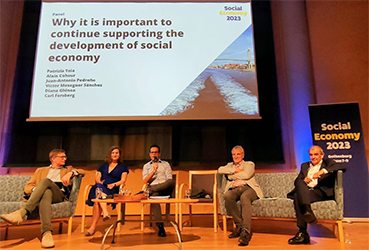During the European Conference on Social Economy held in Gothenburg on 7-9 June, the European Commission announced the imminent publication of its proposal on the Social Economy Recommendation, to be approved by the EU Council during the Spanish Presidency (second half of 2023), approval which is expected to coincide with the European Conference on Social Economy scheduled in San Sebastian on 13-14 November.
This is one of the main objectives of the European Social Economy Action Plan, approved in December 2021. This was the opinion of the Commissioner for Employment and Social Rights, Nicolas Schmit, who added that Europe “will be more resilient thanks to the social economy. In a society where everything is moving fast, the social economy is key to creating a fairer and more inclusive society”.
At the same event, the Second Vice-President and Minister for Employment and the Social Economy of the Spanish Government, Yolanda Díaz, spoke virtually, pointing out that “during the Spanish Presidency of the EU, the social economy must be consolidated as a European structural policy. The EU Council’s recommendation should serve to modernise public policies towards the social economy, making it a key player in the future of Europe and at international level,” she said.
For his part, the President of Social Economy Europe, Juan Antonio Pedreño, also alluded to the impact that the European Commission’s proposal for a Recommendation will have, in order to generate powerful legal frameworks and guarantee the growth of social economy enterprises and organisations in all EU Member States. He also stressed the need to mobilise all European social economy enterprises to increase their visibility. “With the European Social Economy Action Plan and the Recommendation, we we want to change scale, increase employment and public policies”.
Among the more than 60 measures envisaged, Pedreño pointed out the importance of including the Social Economy in education and the need to promote youth entrepreneurship academies in all countries.
On behalf of the European Commission, the intervention of the Head of the Social Economy Unit, Ana Athanasopoulou, was also noteworthy. She recalled the EU’s commitment to the Social Economy, identifying it as one of the 14 industrial ecosystems for recovery, and stated that this business model creates value in the internal market, with great potential for fair green and digital transitions.
Social Economy Europe General Assembly
The day before the European Conference, the General Assembly of Social Economy Europe (SEE) also took place in Gothenburg, with the participation of 60 representatives of the European social economy.
At the Assembly, new challenges and issues were raised in view of the EU presidencies of Spain and Belgium, in the second half of 2023 and the first half of 2024, respectively. The coming months will also be key in driving forward the agenda of the Social Economy in the run-up to the European elections in May 2024.
During the SEE General Assembly, two new members were approved: the Alliance of Italian Cooperatives and the representative organisation of the Ukrainian social economy. With these additions, SEE now has 25 member organisations.







